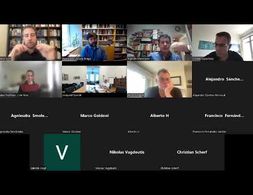✕
424 results
Post-Colonialisms Today researchers Kareem Megahed and Omar Ghannam explain how early post-independence Egypt sought economic independence via industrialization.
The goal of this course is to explore these differences in economic outcomes observed among women and men, measured by such things as earnings, income, hours of work, poverty, and the allocation of resources within the household. It will evaluate women’s perspectives and experiences in the United States and around the world, emphasizing feminist economics.
Mainstream inflation theories in economics do little to explain the recent acceleration in price increases. The associated economic policy recommendations further increase the misery of low-income groups.
Modern Monetary Theory and the Birth of the People s Economy The leading thinker and most visible public advocate of modern monetary theory the freshest and most important idea about economics in decades delivers a radically different bold new understanding for how to build a just and prosperous society Stephanie …
From the two premises that (1) economies are complex systems and (2) the accumulation of knowledge about reality is desirable, I derive the conclusion that pluralism with regard to economic research programs is a more viable position to hold than monism. To substantiate this claim an epistemological framework of how scholars study their objects of inquiry and relate their models to reality is discussed. Furthermore, it is argued that given the current institutions of our scientific system, economics self-organizes towards a state of scientific unity. Since such a state is epistemologically inferior to a state of plurality, critical intervention is desirable.
This syllabus provides an overview of the contents of the course "Understanding Economic Models" at the University of Helsinki.
Exploring Economics, an open-source e-learning platform, giving you the opportunity to discover & study a variety of economic theories, topics, and methods.
Introduction Economics is by necessity a multi paradigmatic science Several theoretical structures exist side by side and each theory can never be more than a partial theory Rothschild 1999 Likening scientific work to the self coordinating invisible hand of the market Michael Polanyi cautioned strongly against centralized attempts to steer …
The concept of financialisation has undergone a similar career as ‘globalisation’, ‘neoliberalism’ or even ‘capitalism’, in the course of which it changed from the explanandum to the explanans; the process of financialisation is taken for granted, while the concrete historical and empirical causal conditions of its realisation and perpetuation are being moved into the background.
This article reviews insights of existing literature on global care chains. A specific focus is laid on the impact that the refugee crisis has on global care chains and in turn how the crisis impacts the de-skilling of the women in the migrant workforce.
Here we look at the effect of the 2008 Climate Change Act passed in Parliament in the United Kingdom as an effort to curb emissions in all sectors. The Act aside from setting goals to become a low-carbon economy sets up an independent committee on Climate Change to ensure the implementation of policies to comply with the ultimate goal of 80% reduction in total emissions in 2050. I make use of the Synthetic Control Method (SCM) to create a comparative case study in which the creation of a synthetic UK serves as a counterfactual where the treatment never occurred (Cunningham, 2018).
In this essay, the principle of capital accumulation, as well as the idea of homo economicus as the basis of the growth model, are located and analyzed from a feminist perspective. The sufficiency approach is presented as an alternative to these two economic logics.
This essay draws on several analyses on the gender impact of the recession and of austerity policies, in which authors acknowledge a threat to women’s labour market integration and a potential backlash to traditional gender labour structures. We contribute to that literature by asking whether recession and austerity convey a gender effect on educational attainment. Our aim in this essay is to portray the likely effects of austerity measures on gender equality with a focus on women’s participation in tertiary education and to hypothesize the implications of these scenarios for labour market effects, to be tested in future empirical research.
This article explores if power dynamics in the household can be changed, and if so, how. In this context the focus is laid on government childcare policy and its various channels of possible influence.
Aim of this intensive workshop is to understand macroeconomic workings of climate change as as the background of sustainable finance; to analyse financial assets with ESG (Environmental, Social and Governance) criteria attached to them and their markets and important institutional players; to develop a critical perspective on the current setup of sustainable finance; and to synthesise this knowledge by applying it on in-depth case studies.
This essay suggests to bring together two aspects of economic thought which so far have developed largely separately: degrowth and feminist economics. In this strive, the concept of care work and its role in feminist economics will be introduced and the downsides of the commodification of care work will be discussed. Subsequently, contributions to the discussion on the (re)valuation of care work will be taken into account.
One hundred years ago the idea of 'the economy' didn't exist. Now, improving the economy has come to be seen as perhaps the most important task facing modern societies. Politics and policymaking are conducted in the language of economics and economic logic shapes how political issues are thought about and addressed.
Central banking is anything but clear-cut. As this webinar with Benjamin Braun demonstrates, the standard view of central banks as independent public entities that govern financial markets and "print" money is at least partially misleading.
Exploring Economics, an open-access e-learning platform, giving you the opportunity to discover & study a variety of economic theories, topics, and methods.
There was a time when the world still seemed a good and above all simple place for monetary authorities Every few weeks they had to decide whether in view of the latest price developments it would be better to raise the key interest rates by a quarter point or not …
Florian Kern replies to Zoltan Pozsar's analysis about the effects of the war in Ukraine on the global financial order and refutes the latter's prognosis of the demise of the US dollar as the world's reserve currency
This is the second part of the seminar A Hard Currency of Politics The discussion centers on the The Currency of Politics by Stefan Eich and is hosted by the journal European Law Open Stefan Eich s presentation of his argument starts at minute 7 53 The discussion centers on …
This self-paced free course by Perry Merhling guides you to his "Money View" approach that integrates the fields of economics and finance. The course can easily be understood by people interested people without technical economic knowledge or training as it is primarily a tool for analysis.
Jo Michell discusses some key implications of climate change regarding the standard policy prescriptions of Post-Keynesian economics, particularly relating to the possible necessity of consumption constraints and the presence of recurrent inflation.
Racism and discrimination have choked economic opportunity for African Americans at nearly every turn. In From Here to Equality, William Darity Jr. and A. Kirsten Mullen confront these injustices head-on and make the most comprehensive case to date for economic reparations for U.S. descendants of slavery.
The article pursues the two related questions of how economists pretend to know and why they want to know at all. It is argued that both the economic form of knowledge and the motivation of knowing have undergone a fundamental change during the course of the 20th century. The knowledge of important contemporary economic textbooks has little in common with an objective, decidedly scientifically motivated knowledge. Rather, their contents and forms follow a productive end, aiming at the subjectivity of their readers.
A central question in development economics literature is, “Why do countries stay poor?” The key disagreements are whether the lack of economic growth stems from institutions or from geography (Nunn 2009). From an institutional perspective, hostile tariff regimes and commodity price dependencies form a barrier to a sectoral shift that would otherwise lead to economic development in developing countries (Blink and Dorton 2011) (Stiglitz 2006).[i]
An essay of the writing workshop on Nigeria’s Readiness for and the Effect of the Fourth Industrial Revolution
The premise of this workshop is that we, as knowledge producers - especially within westernized universities (Grosfoguel, 2013), are significantly implicated in neoliberal imaginaries that are often in service of hierarchical, binary, competitive and linear narratives of growth as civilizational progress.
Health Economics traditionally involves two distinct strands. One focuses on the application of core neoclassical economic theories of the firm, the consumer and the market to health-seeking behaviour and other health issues. It suggests a role for government intervention only in the case of specific market failures (for example externalities, asymmetric information, moral hazard, and public goods) that distort market outcomes. The second strand is evaluation techniques, used to assess the cost effectiveness of competing health interventions.
Trade disputes are usually understood as conflicts between countries with competing national interests, but as Matthew C. Klein and Michael Pettis show in this book, they are often the unexpected result of domestic political choices to serve the interests of the rich at the expense of workers and ordinary retirees.
After completing the module, participants should be able to understand the economic consequences of gender inequality. They should be able to explain the contradictions between capital and care, analyze the labor market with a gender perspective and develop the ability to describe phenomena such as public policies taking into account "gender" as a category of analysis.
We use cookies on our website. Click on Accept to help us to make Exploring Economics constantly better!

























